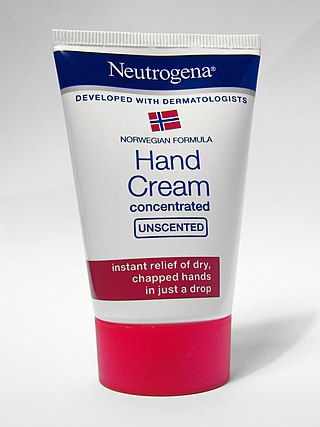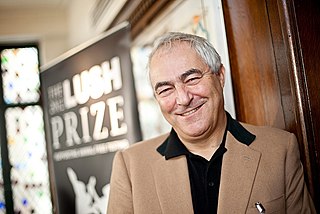Avon Products, Inc. or simply known as Avon, is an Anglo-American multinational company selling cosmetics, skin care, perfume, and personal care products, It is a multi-level marketing company based in London. In 2020, Avon had annual sales of $9.1 billion worldwide.

Cosmetics are composed of mixtures of chemical compounds derived from either natural sources or synthetically created ones. Cosmetics have various purposes. Those designed for personal care and skin care can be used to cleanse or protect the body and skin. Cosmetics designed to enhance or alter one's appearance (makeup) can be used to conceal blemishes, enhance one's natural features, add color to a person's face, or change the appearance of the face entirely to resemble a different person, creature or object. Cosmetics can also be designed to add fragrance to the body.

Colgate-Palmolive Company is an American multinational consumer products company headquartered on Park Avenue in Midtown Manhattan, New York City. The company specializes in the production, distribution, and provision of household, health care, personal care, and veterinary products.

Iceland Foods Limited, trading as Iceland, is a British supermarket chain headquartered in Deeside, Wales. It mainly sells frozen foods, including prepared meals and vegetables, alongside non-frozen grocery items such as produce, meat, dairy and dry goods. The company also operates a chain of shops called The Food Warehouse.
Revlon, Inc. is an American multinational company dealing in cosmetics, skin care, perfume, and personal care. The headquarters of Revlon was established in New York City on March 1, 1932, where it remains. Revlon was founded by brothers Charles and Joseph Revson, and chemist Charles Lachman. Revlon products are sold in 150 countries and the company has many global locations including Mexico City, London, Paris, Hong Kong, Indonesia, Sydney, Singapore, and Tokyo.

The Estée Lauder Companies Inc. is an American multinational cosmetics company, a manufacturer and marketer of makeup, skincare, perfume, and hair care products, based in Midtown Manhattan, New York City. It is the second largest cosmetics company in the world after L'Oréal. The company owns a diverse portfolio of brands, including La Mer, Jo Malone London, Clinique and Tom Ford Beauty, among many more, distributed internationally through both digital commerce and retail channels.
L'Oréal S.A. is a French personal care company headquartered in Clichy, Hauts-de-Seine, with a registered office in Paris. It is the world's largest cosmetics company and has developed activities in the field, concentrating on hair color, skin care, sun protection, make-up, perfume, and hair care.

The Body Shop International Limited, trading as the Body Shop, is a British cosmetics, skin care, and perfume company founded in 1976 by Anita Roddick. In 2017, it stated that its products were sold in about 3,000 stores, some company-owned and others franchised, in 66 countries.

Sephora is a French multinational retailer of personal care and beauty products with nearly 340 brands, along with its own private label, Sephora Collection, and includes beauty products such as cosmetics, skincare, fragrance, nail color, beauty tools, body lotions, and haircare.

Neutrogena Corporation, trading as Neutrogena, is an American company that produces cosmetics, skin care and hair care and owned by parent company Kenvue and is headquartered in Los Angeles, California. According to product advertising at their website, Neutrogena products are distributed in more than 70 countries.

L'Occitane en Provence, "the Occitan woman ," commonly known as L'Occitane, is a French luxury retailer of body, face, hair, fragrances, and home products based in Manosque, France. It was founded in 1976 by Olivier Baussan, with the purpose to create a company that celebrates and preserves the traditions of his native Provence. In 2010, the company became listed on the Hong Kong Stock Exchange.

Olay or Olaz, previously Oil of Olay, Oil of Olaz, Oil of Ulan or Oil of Ulay, is an American skin care brand owned by Procter & Gamble. For the 2009 fiscal year, which ended on June 30, Olay accounted for an estimated $2.8 billion of P&G's revenue.

Shiseido Company, Limited is a Japanese multinational cosmetic company founded in Tokyo, Japan in 1872. Its product categories consist of: skin care, makeup, body care, hair care, and fragrances. The company is one of the oldest cosmetic companies in the world and celebrated its 150th anniversary in 2022. It is the largest cosmetic firm in Japan and the fifth largest cosmetic company in the world. In Japan, Shiseido is available at cosmetic counters at selected department stores and most pharmacies. The company owns numerous brands and subsidiaries worldwide, in addition to its founding label. The company is headquartered in Tokyo, and is traded on the Tokyo Stock Exchange, where it is a constituent of the Nikkei 225 and TOPIX Large70 indices.
Superdrug Stores plc is a health and beauty retailer in the United Kingdom, and the second largest behind Boots UK. The company is owned by A.S. Watson Ltd which is part of the A.S. Watson Group. It was acquired as part of the buyout of Kruidvat BV in October 2002. The A.S Watson Group is itself part of the Hong Kong conglomerate CK Hutchison Holdings.
Beauty Without Cruelty (BWC) was founded as an educational charitable trust in England in 1959 by Muriel, the Lady Dowding (1908–1993), past president of the National Anti-Vivisection Society (NAVS) and wife of Lord Dowding (1882–1970), the former commander-in-chief of RAF Fighter Command during the Battle of Britain. It investigated and exposed the brutality inflicted on animals in the fur and cosmetic trade and led the way in the commercial production of synthetic alternatives to fur and cosmetics, without the use of animal ingredients and not tested on animals, pioneering the cruelty-free movement. The initial fundamental purpose of the charitable trust was to demonstrate that alternatives to cruelly derived clothing and cosmetics were easily obtainable and, if they did not exist, to get them on the market. BWC spread the concept that one could easily look beautiful, without inflicting cruelty and death upon any creature.

The cosmetic industry describes the industry that manufactures and distributes cosmetic products. These include colour cosmetics, like foundation and mascara, skincare such as moisturisers and cleansers, haircare such as shampoos, conditioners and hair colours, and toiletries such as bubble bath and soap. The manufacturing industry is dominated by a small number of multinational corporations that originated in the early 20th century, but the distribution and sale of cosmetics is spread among a wide range of different businesses. Cosmetics must be safe when customers use them in accordance with the label's instructions or in the conventional or expected manner. One measure a producer may take to guarantee the safety of a cosmetic product is product testing. FDA occasionally does testing as part of its research program or when looking into potential safety issues with a product. Both the cosmetics business and consumers can benefit from the FDA's resources on product testing.

Mark Constantine OBE is a British entrepreneur and trichologist best known as the co-founder and CEO of Lush, described as "one of the world's biggest cosmetics firms".

Douglas GmbH is a German multinational perfumery and cosmetics chain. Its headquarters are located in Düsseldorf, Germany. The first perfumery to carry the name "Parfümerie Douglas" opened in Hamburg in 1910. Douglas GmbH was part of the Douglas Holding, but since 1 June 2015, 85 percent belong to the financial investor CVC Capital Partners and 15 percent to the Kreke family.

Forest Essentials is an Indian cosmetics, skincare and perfume company that specialises in Ayurvedic preparations for its products. It was founded in 2000 by Mira Kulkarni in New Delhi, India.

A beauty store, beauty supply store or cosmetics store is a specialty retail business that sells cosmetics, hair-care products and/or beauty tools. The term "beauty store" is often associated with large chains that provide a large-format, glamorous shopping experience whereas "beauty supply store" is associated with smaller, independent retailers.


















